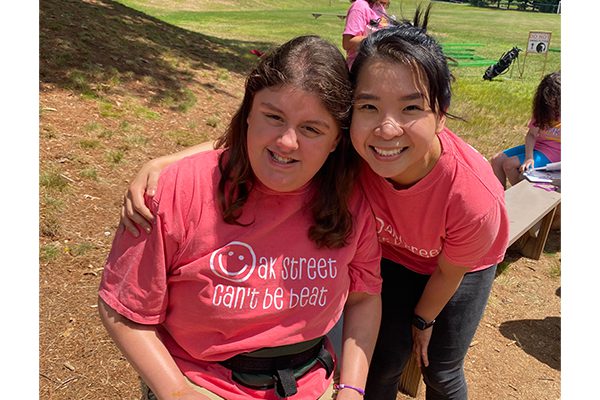Irene Looi, MS, BCBA, LABA, is a day coordinator for The New England Center for Children’s (NECC) Oak Street residence and a doctoral student in the Western New England University (WNEU) partner program. Looi came to NECC six years ago from Malaysia to work as a graduate assistant and to take advantage of earning a free master’s degree. In the last six years, she has held several roles, including level 2 teacher, case manager, and residential coordinator. The Oak Street teachers collectively nominated Looi for Staff Spotlight for her “dedication to the girls and support of the teachers,” for being a “constant source of joy and positivity,” for serving as an “incredible role model for all of us at Oak Street,” and for being able to “pull off multiple leadership styles effectively.” Read the full Irene Appreciation Letter to learn more about what Looi brings to her team.
How long have you worked for NECC?
I’ve been here for six years! I started as a level 2 teacher on ITT Apartment 4 and held the protective measures reports role—before the protective measures database was available to everyone on the iPad, we had to write down every protective measure on paper and someone had to sum it every week—that was me for a year. I was then a case manager to a wonderful student before transferring to Salem End Road, where I was the clinical and back-up core shift manager (CSM) role with a fun and charming team of students and teachers. About a year later, I joined Oak Street as a residential and then day coordinator to a group of young, energetic, and lovely girls.
What is your favorite part of your job?
I love my team of teachers. This job is not easy, but when you have a strong and passionate team of teachers, it makes every day much better. I love seeing the effort my team takes to make every day better for our students, whether it’s spending an extra five minutes to braid their hair or paint their toenails, warming up their dinner, presenting all kinds of options for salad dressing, group managing when we’re short staffed so that another teacher could run a teaching class with a student, etc. It’s just wonderful to see, experience, and live in a teamwork-driven environment.
Why did you choose a career in helping children with autism?
To be honest, 12 years ago, I had a crush on someone who told me about his little cousin who was diagnosed with a learning difference. I was in marketing back then, freshly graduated, and ready to enter the corporate world. I went on to do some research on children with special needs, so that I would impress this crush of mine. One thing led to another, and I soon found myself volunteering at a school for children with special needs. I never spoke to that crush again, but I signed myself up for a diploma for child psychology and special needs. Since then, I started working with children with autism and never looked back! It’s funny how things turn out.
Why NECC?
Growing up and living in Malaysia, I always wanted to study abroad because I thought it would be a really cool experience. However, it simply wasn’t a financially feasible option for my family. Just when I was about to give up on that dream, someone told me about NECC’s graduate program with WNEU. I joined NECC as a graduate assistant and started the master’s program simultaneously. I’m forever thankful for this opportunity to experience the American dream. Back then I was intrigued about behavior analysis, now it’s perhaps the only thing that makes sense to me!
You enrolled in one of NECC’s PhD partner programs, correct?
After I received my master’s degree in applied behavior analysis (ABA), I considered the possibility of lecturing and conducting research. I do enjoy both learning and teaching and thought the WNEU doctoral program might be suitable. With Dr. Cammarie Johnson as my trusty advisor, I embarked on the PhD in behavior analysis journey.
What was your master’s degree research about?
For my master’s research, I trained special needs education teachers in Malaysia to deliver social praise to their students in a busy classroom environment. My article, “Examining the Effects of Behavioral Skills Training on Social Praise Delivery in Malaysian Classrooms,” which was co-authored by Dr. Johnson, was published few months ago in the Journal of International Special Needs Education.
In addition to being a teacher, you are also a fantastic artist and recently donated some work to the NECC Art Show. How long have you been an artist? What is your favorite medium to work with?
I have loved painting since I was little. I remember fondly that my best childhood days were attending art classes on Saturdays. Watercolor has always been my go-to. I still paint on my own time these days, and I hope that one day I’ll have my own art studio!
What is something about you that your colleagues might be surprised to learn—other than being a talented artist?
I did Muay Thai for a few years back in Malaysia. I enjoy kickboxing so much that when COVID hit and all the martial classes were shut down, I invested in a kickboxing bag and it’s perhaps the best money spent so far!
Who is someone you look up to?
There are so many people I look up to— my friends, supervisors, family members, professors, teachers on my team, etc. I can’t pinpoint one person to whom I look up; I think it would be dangerous for me to do that because we’re all humans and are equally susceptible to pain, loss, and errors. I try to live by learning from my past mistakes and taking from wisdoms that other people are willing to share with me.
What is your life philosophy or a motto you like to live by?
When she was alive, my grandmother spoke to me about dukkha, a Pali word for suffering. There is a sense of wisdom and serenity that comes with the acceptance that suffering is inevitable. Dukkha is not meant to convey a negative view about the world, but rather, my grandmother offered it as a pragmatic perspective so that I would be ready to deal with the world as it is. That’s been my mantra ever since.

